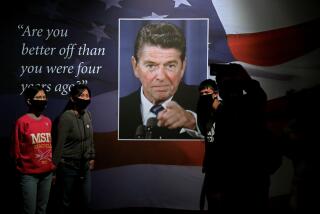Op-Ed: Reagan’s Goldwater speech: Still great after all these years
Monday marks the 50th anniversary of private citizen Ronald Reagan’s landmark speech in behalf of Barry Goldwater’s presidential candidacy in 1964. Reagan’s remarks gave meaning to a campaign the establishment had said was a fool’s errand, and offered a response to those who said conservatism was not sophisticated or viable as a governing force.
The facts have proved otherwise, and that speech made Reagan the leading conservative in America. Years after his passing, he still holds that title. Who calls himself a Nixon Republican or a Bush Republican? Most call themselves Reagan Republicans, even if they don’t know the true meaning of Reaganism.
Even many Democrats, Barack Obama and Bill Clinton among them, invoke (or try to reinvent) Reaganism. Yet in the face of the failed big-government Republicanism of recent history and the failed collectivism of the Democratic Party, men like Jeb Bush say the country and the GOP need to move past the “nostalgia” for Reaganism’s heyday. A top Republican consultant, Ford O’Connell, recently wrote: “Ronald Reagan is dead. Accept it. The Reagan fixation is a drag on the future.”
So what are the Bush Republicans missing? Reagan’s New Federalism was the most successful governing philosophy of the 20th century, and that includes the New Deal, which never did solve the Depression. Only the Lend-Lease program and our entry into World War II did that. New Federalism was certainly more successful than the Great Society.
Reaganism is not about Reagan, who often said, “Don’t trust me, trust yourself.” He believed in the individual over the state.
An examination of Reagan’s speech for Goldwater shows the continuing relevance of his revolutionary, populist approach to government.
He said: “I have spent most of my life as a Democrat. I recently have seen fit to follow another course. I believe that the issues confronting us cross party lines.”
Reagan left his party because he sharply disagreed with the leadership, but also because he believed solutions could be found that would satisfy the rank and file of both parties.
“As for the peace that we would preserve, I wonder who among us would like to approach the wife or mother whose husband or son has died in South Vietnam and ask them if they think this is a peace that should be maintained indefinitely.”
Reagan was arguing against an endless war, one that enriched the established order. Who can argue that America is stronger after nearly 25 years of fighting wars in the Middle East?
He declared: “It’s time we asked ourselves if we still know the freedoms intended for us by the Founding Fathers.”
This question may be more relevant now than in 1964. Under the George W. Bush and Obama administrations, the Bill of Rights has been torn apart. Americans are not secure in their papers and homes as prescribed by the 4th Amendment. Americans can be imprisoned without due process under the Patriot Act, and our 1st Amendment rights of association and petitioning the government are under siege.
An arrogant and privileged political class in Washington has grown out of both parties. Reagan would be appalled. As he said, “Government is beholden to the people, that it has no other source of power except the sovereign people.”
Obamacare — again, Reagan’s words apply: “If government planning and welfare had the answer, shouldn’t we expect government to read the score to us once in a while? Shouldn’t they be telling us about the decline each year in the number of people needing help? But the reverse is true. Each year, the need grows great, the program grows greater.”
Bingo. Shame on the Republican Party for not making this argument. Government has failed abysmally. Poverty is worse, public education is worse, corruption is worse. The American people are losing and the bureaucracy is winning.
Reagan successfully transferred ill-gotten power from a corrupt city by the Potomac back to the individual, where the framers intended it. But the last 14 years have seen a dangerous reversal.
Reagan said: “If we lose this way of freedom, history will record with the great astonishment that those who had the most to lose did the least to prevent its happening.” It is not hard to close your eyes and imagine Reagan, in 2014, talking about Washington and not the Soviet Union.
Reagan concluded his remarks with this: “You and I have a rendezvous with destiny. We’ll preserve for our children this, the last best hope of man on Earth, or we’ll sentence them to take the last step into a thousand years of darkness.”
Given the darkness that shrouds so much the world and the pessimism that so many Americans feel about their future, we’d say Reaganism is more than relevant today.
Craig Shirley, a public affairs consultant and commentator, is author of two books on Ronald Reagan. Laura Ingraham is an author and host of a talk radio show.
Follow the Opinion section on Twitter @latimesopinion
More to Read
A cure for the common opinion
Get thought-provoking perspectives with our weekly newsletter.
You may occasionally receive promotional content from the Los Angeles Times.






